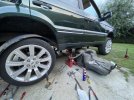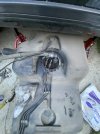Hi all, my name is Bart. I recently bought a 1998 p38 Range Rover. It is a 2.5 diesel and automatic.
I bought this as a project car so not a daily driver. I’m not a car mechanic and I have never worked on cars before. I did work on older motorcycles but that’s not the same right. I bought the car as a no runner so they delivered it on my doorstep with a trailer. The car has already run 312k km!
It belonged to an older guy, the car sat for several years and then somebody wanted to bring it back on the road. At first sight I noticed the car had a new radiator, viscous coupling, starter and solenoid, brake disk all around. I suspect the timing chains are new looking at the engine ( there’s silicone sealant on the covers) and everything in the engine looks clean.
However the car had a non working air suspension but at least the eas system was still in place. It also was difficult to start but then I noticed air bubbles in the feed line to the injection pump. Battery was dead and so on.
The first thing I did was buying a battery so I could start the car, it took a while to get her going. I tested the in tank fuel pump by bridging relay 12 and no pressure arrived at the fip.
Past weekend I removed the fuel tank and replaced the in tank fuel pump, seal and fill hose.
The car started from the first try ( after priming). That was a relief! However I couldn’t help notice a leak at injector 6 and also a puddle of diesel under the engine ( not the tank). The return lines look new and the only injector with a puddle of diesel is number 6. That being said I find my engine runs good although I cannot drive it on the road (no plates currently) but it does make some noise and I cannot say if it is normal. I attached a small video file, maybe somebody can tell me it’s normal or not. To my ears there seems to be a knock and it seems to come from around the oil filter.
I also bought a nanocom and noticed the fueling is at 8 to 9 mg/stroke. Isn’t that too much or should I leave it alone?
Anyways your thoughts are welcome.
Cheers
I bought this as a project car so not a daily driver. I’m not a car mechanic and I have never worked on cars before. I did work on older motorcycles but that’s not the same right. I bought the car as a no runner so they delivered it on my doorstep with a trailer. The car has already run 312k km!
It belonged to an older guy, the car sat for several years and then somebody wanted to bring it back on the road. At first sight I noticed the car had a new radiator, viscous coupling, starter and solenoid, brake disk all around. I suspect the timing chains are new looking at the engine ( there’s silicone sealant on the covers) and everything in the engine looks clean.
However the car had a non working air suspension but at least the eas system was still in place. It also was difficult to start but then I noticed air bubbles in the feed line to the injection pump. Battery was dead and so on.
The first thing I did was buying a battery so I could start the car, it took a while to get her going. I tested the in tank fuel pump by bridging relay 12 and no pressure arrived at the fip.
Past weekend I removed the fuel tank and replaced the in tank fuel pump, seal and fill hose.
The car started from the first try ( after priming). That was a relief! However I couldn’t help notice a leak at injector 6 and also a puddle of diesel under the engine ( not the tank). The return lines look new and the only injector with a puddle of diesel is number 6. That being said I find my engine runs good although I cannot drive it on the road (no plates currently) but it does make some noise and I cannot say if it is normal. I attached a small video file, maybe somebody can tell me it’s normal or not. To my ears there seems to be a knock and it seems to come from around the oil filter.
I also bought a nanocom and noticed the fueling is at 8 to 9 mg/stroke. Isn’t that too much or should I leave it alone?
Anyways your thoughts are welcome.
Cheers



